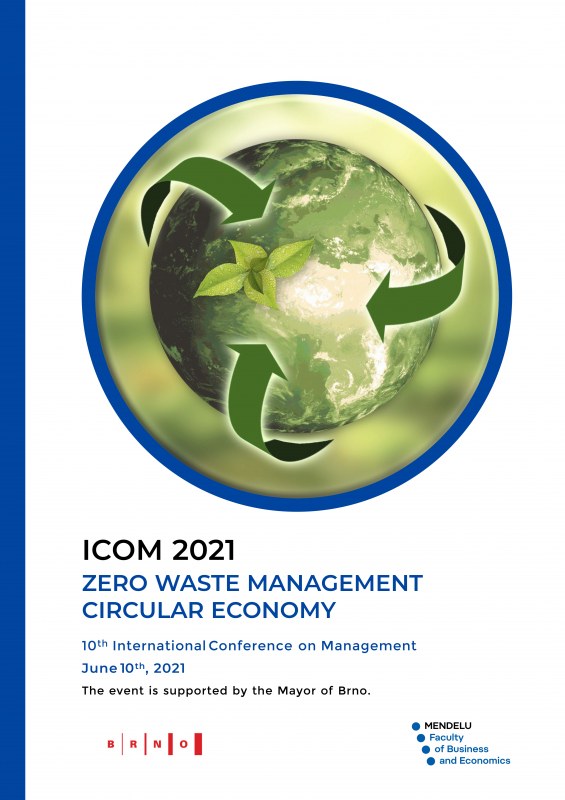
DOI: 10.11118/978-80-7509-820-7-0153
SUSTAINABLE DEVELOPMENT AND ITS CHALLENGES IN THE CONTEXT OF GLOBAL ECONOMY
- Robert JANIK
The environment has been ravaged and overexploited by human beings almost from the dawn of civilization. However, no sooner that in the course of the industrial revolution did the extensive exploitation of the Earth 's resources, combined connected with the destruction of nature on a really great scale being a side-effect of economic activities, commence.
Along with the globalization process, and the spread of the business philosophy of ’’profit at any cost’’, the situation was becoming ever more serious. This as well as many ecological disasters caused by human activity made mankind aware of the ’’shape of dangers to come’’ and the need to counteract the degradation of the environment, which gave rise to various environment protection concepts. Among them, ’’sustainable development’’, offering a well-balanced approach to the relationship between mankind and the environment, plays an essential role.
Sustainable development, which, meanwhile, has become a sui generis universal doctrine, is based upon three main pillars: social inclusion, economic growth and environment protection. According to the majority of public opinion, it is an adequate response to many contemporary challenges. However, it is not easy to implement its goals nowadays as there are many challenges, most of which are connected with the effects of catastrophes connected with climate changes, the scarcity of resources, soil and air contamination, social inequalities, political tensions, at times leading to wars, or business' selfish attitudes and nationalistic ’’sacro egoismo’’.
To be effective, sustainable development must cover several key areas of mankind aktivity such as education, economy or health care. Decision-makers like entrepreneurs and managers can play an important role in this endeavour.
The purpose of this article is to holistically present the possibilities of implementing sustainable development concept in the context of relevant previous experiences and the current threats. This article fills the existing gap in research evidenced by the content of the literature of the subject.
Methodology approach: The specificity of this research rendered it necessary to use the documentary research method and historical research method.
Social implications: In the area of application, this article presents the conclusions resulting from it having become possible to sustainable development concept as well as possible difficulties in this respect. In this context, the role of human consciousness in finding the best solutions to the difficulties faced by all the stakeholders of implementing sustainable development concept was emphasized.
Keywords: sustainable development, production, environment resources, globalization
pages: 153-161, Published: 2021, online: 2021
References
- Acemoglu, D., Robinson J. A. 2013. Why Nations Fail. London: Pofile Books.
- Adams, R. M., Anderson, L. R. 2019. Policing in Natural Disasters. Philadelphia, Rome, Tokyo: Temple University Press.
- Akerlof, G. A., Shiller, R. J. 2009. Animal Spirits. Princeton and Oxford: Princeton University Press.
- Cavanagh, J., Mander, J., 2004. Alternatives to Economic Globalization. San Francisco: Berrett-Koehler Publishers,.
- Dekking, F. M., Kraaikamp, C., Lopuhaä, H. P., Meester, L. E. 2010. A Modern Introduction to Probability and Statistics: Understanding Why and How. Lindon: Springer.
- Elias, N. 2017. The Civilizing Process. Oxford: UK Blackwell Publishing.
- Esguerra, A., Helmerich, N., Risse, T. 2017. Sustainability Politics and Limited Statehood Contesting the New Modes of Governance. [e-book]. Springer.
 Go to original source...
Go to original source... - Gilbert, M. 2012. European Integration. Roman & LITTLEFIELD PUBLISHERS, INC.
- Hannerz, U. 2010. Anthropology's World. New York: Pluto Press.
- Lalenti, V. 2020. Deep Time Reckoning: How Future Thinking Can Help Earth Now. London: The MIT Press.
 Go to original source...
Go to original source... - Livi-Bacci, M. 2012- A Short History of Migration. Polity: Polity.
- Johnson, D., Turner, C. 2016. European Business. London, New York: Routledge,.
- Kumar, R. 2014. Research Methodology. London: SAGE.
- Mambretti, S., Miralles i Garcia, J. L. 2020. Urban Agriculture and City Sustainability II. London.
- Marshall, T. 2016. Prisoners of Geography. Croydon: CPI Group (UK) Ltd.
- Murray, D. 2017. The Strange Death of Europe. London: Bloomsbury.
- Neuendorf, K. 2002. The Content Analysis Guidebook. Thousand Oaks, CA: Sage Publications.
- Pikketty, T. 2014. Capital in the Twenty-First Century. Cambridge, Massachusetts, London: The Belknap Press of Harvard University Press.
- Singer, P. 2016. A Companion to Ethics, Blackwell Publishing. Singapore.
- Singer, P. 2004. One World. NewHaven&London: Yale University Press.
- Singer, P. 2017. Practical Ethics. Cambridge: Cambridge University Press.
- Steger, M. B. 2009. Globalization. Oxford: Oxford University Press.
- Stiglitz, J. E. 2016. The Great Divide. Penguin Book, Great Britain.
- Trafialek, E. 2010. Education towards demographic old age. In: Ekonomiczny, socjalny, ekologiczny kontekst współczesnych problemów międzynarodowych. Winnica: Instytut Ekonomiczny Ukrainy, pp. 304-318.
- Weber, M. 2009. Die protestantische Ethik. Köln: Anaconda.
- Zielinski, P. 2014. The Education of the Vietnamese Minority in Poland. Wydawnictwo Naukowe UAM, Studia Edukacyjne, 33: 393-412.
 Go to original source...
Go to original source...


